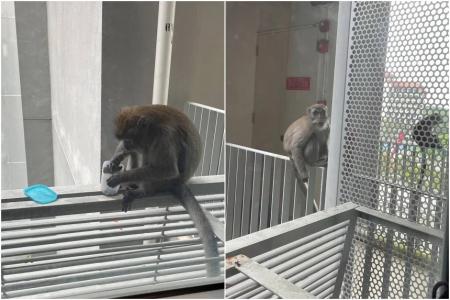Relocating macaques from NTU not long-term solution, say experts
Despite monkey-proofing rubbish bins and relocating some animals earlier this year, their foraging for food on campus is still a problem at Nanyang Technological University (NTU).
Macaques have been seen on its grounds more frequently, and there have been a few cases of intrusions into residential halls to seek food, said the university.
It has worked with the National Parks Board (NParks) to relocate two of the three frequently sighted macaques to nature conservation areas.
But experts said this is not a long-term solution, and urged hall residents to keep their windows shut and curtains drawn to deny the animals access to food in their rooms.
Ms Anbarasi Boopal, 39, co-chief executive of Animal Concerns Research and Education Society (Acres), said that although relocation is commonly suggested by the public, "it betrays a misunderstanding of wildlife ecology and macaque behaviour".
She noted that relocation should be used only when a site is identified to be an unsuitable habitat and macaques do not have another way to reach a suitable habitat naturally.
Conservation group Jane Goodall Institute Singapore (JGIS) noted that relocation is not ideal but said it understands the university's constraints in preventing human-macaque conflict.
"Relocation should be used only as the final resort after all efforts have been exhausted," it said, noting that relocation is not a long-term solution as other macaques may enter the campus.
JGIS said: "As long as students keep their distance and not provide food, be it deliberately or indirectly through unattended food or unlatched bins, it would be good."
As the country moves towards becoming a "City in Nature", it is important that people learn to coexist with wild animals, it added.
"It is possible to co-exist when we are equipped with the information on what to do when we encounter them, along with some respect... of our local biodiversity."
Located next to forests in the western catchment area, NTU is home to a wealth of wildlife including the sunda pangolin, oriental pied hornbill, buffy fish owl and smooth-coated otters.
In response, Dr Adrian Loo, NParks' group director of wildlife management, said: "Relocation is done on a case-by-case basis and is usually carried out after other measures such as monkey guarding have been exhausted. In the case of the macaques at NTU, there were repeated cases of macaques intruding into students' rooms in the residential halls.
"Hence NParks assessed that for public safety, it was best to relocate two of them."
While NTU did not specify the number of monkey break-ins, Telegram chat groups such as NTU Monkey Watch posted at least 10 videos and photos this year.
NTU environmental club Earthlink is putting together a handbook to advise students on what to do when encountering wild animals on campus.
NTU has also beefed up its defences, replacing more than 1,200 rubbish bins last year with ones that have latches to prevent macaques from foraging for food.
Educating the public on good wildlife etiquette is key, Ms Anbarasi said."As long as the root cause of food availability remains present, other macaques will simply come in to take (the place of those which have been relocated)."
How to prevent macaque intrusions and what to do when you encounter them, according to Jane Goodall Institute Singapore and the National Parks Board:
• Clap your hands slowly to let the monkeys know you intend to walk past them
• Do not go near baby monkeys and their mothers
• Do not imitate the monkeys' facial expressions
• Keep food out of sight
• Prevent any easy access into your home by installing grilles or mesh
Get The New Paper on your phone with the free TNP app. Download from the Apple App Store or Google Play Store now



